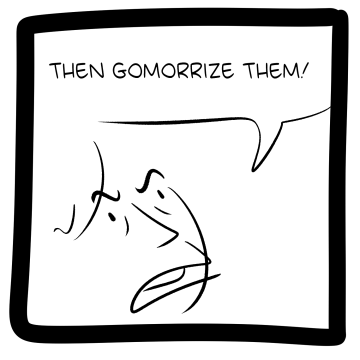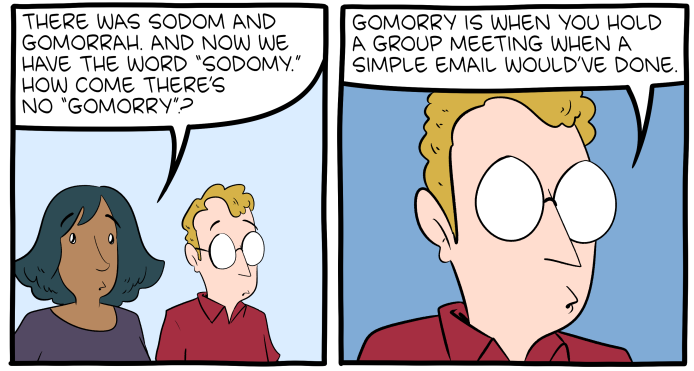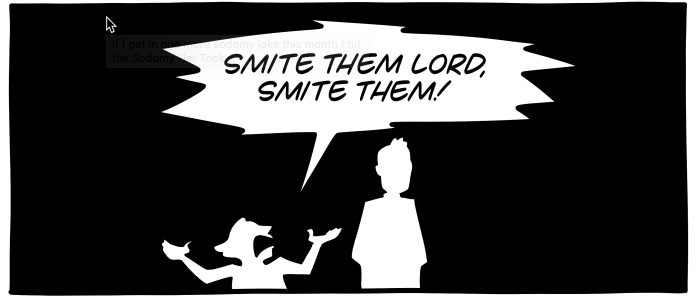New word of the week
« previous post | next post »
From today's SMBC:
The last panel:
The aftercomic:

The mouseover title: "If I get in one more sodomy joke this month I hit the Sodomy Hat Trick."
(Which refers to this earlier comic.)
April 19, 2020 @ 6:00 am · Filed by Mark Liberman under Linguistics in the comics
« previous post | next post »
From today's SMBC:
The last panel:
The aftercomic:

The mouseover title: "If I get in one more sodomy joke this month I hit the Sodomy Hat Trick."
(Which refers to this earlier comic.)
April 19, 2020 @ 6:00 am · Filed by Mark Liberman under Linguistics in the comics
Powered By WordPress


Richard Hershberger said,
April 19, 2020 @ 7:42 am
I love it! Those meetings are a particular pet peeve of mine. The person calling the meeting is either too lazy or too illiterate to compose a coherent email, so he instead wastes every's time (including, ironically, his own) so he can instead ramble on, eventually conveying those three minutes worth of information. I will make a point of adding "gomorry" to my active vocabulary.
John F said,
April 19, 2020 @ 8:32 am
The truism ‘no-one reads email’ is matched by ‘in a meeting everyone is writing emails about something completely different’.
M. Paul Shore said,
April 19, 2020 @ 12:36 pm
When a meeting gets called and your workday gets stalled, that’s Gomorry.
mg said,
April 19, 2020 @ 12:37 pm
@John F – especially in teleconferences or Zoom meetings.
Yuval said,
April 19, 2020 @ 2:06 pm
He just leapt for that hat-trick.
Brett said,
April 19, 2020 @ 5:35 pm
Actually, that was yesterday's SMBC. And guess what? Today's comic does indeed feature a third sodomy joke.
djw said,
April 19, 2020 @ 8:31 pm
M. Paul Shore, that's *terrible*! Thanks!
Chris C. said,
April 21, 2020 @ 12:46 am
It's not as if anyone ever actually reads an email all the way through, if it's longer than 1 short paragraph.
Philip Taylor said,
April 21, 2020 @ 5:09 am
Chris C — "It's not as if anyone ever actually reads an email all the way through, if it's longer than 1 short paragraph".
Perhaps Twitter users, and those who routinely send and receive text messages on their mobile 'phones, might lack the attention span to properly assimilate a multi-paragraph e-mail, but for some of us a well-crafted e-mail is a joy to receive and to read, and is in effect a replacement for the letters sent regularly by previous generations.
Viseguy said,
April 23, 2020 @ 7:43 pm
@djw and @M. Paul Shore: Dean Martin is spinning is his grave, while emitting belly laughs.
@Philip Taylor: I've never seen "mobile 'phone" written with an apostrophe. This prompted me to go on Google Books Ngram Viewier: It seems that "'phone", with a leading apostrophe, peaked (in books, at least) just before 1920, but has seen something of a resurgence in the early 21st Century. "Mobile 'phone", however, returns "No valid ngrams to plot".
Viseguy said,
April 23, 2020 @ 7:45 pm
That "Viewier" was deliberate: it's more viewy than "Viewer".
Philip Taylor said,
April 24, 2020 @ 5:44 am
[mobile 'phones] — I have abbreviated "telephone" to " 'phone " (when I abbreviate it at all) for as long as I have been aware that " 'phone " is an abbreviation ((we did not have a telephone at home until I was in my mid-to-late twenties, so the word was not in common use in my family).
But you remind me of a problem that cropped up when I was proof-reading, copy-editing and typesetting An Oral History of Horsmonden. One of our more punctilious informants routinely abbreviated "omnibus" as " 'bus ", whilst all others used the almost-ubiquitous " bus " — we in the editorial team therefore had to decide which was more important : consistency, or respecting the rights of our then-President to spell " 'bus " as he saw fit, whilst according the same courtesy to our other informants. I think that we opted for the latter, but I can no longer be sure …
Andrew Usher said,
April 24, 2020 @ 7:26 am
If you were transcribing originally spoken speech, I would make consistency more important because the spelling of those transcribing it shouldn't be a distraction. The two spellings after all do not reflect any difference in speech.
I wouldn't write 'phone' with the apostrophe anymore, as it has undergone the same evolution as 'bus'. The only difference is that the full form 'telephone' remains in use – or does it? I suspect that there may now be many that would associate 'telephone' exlusively with the non-mobile, corded variety.
I think you should have realised that the sentence about e-mail was an example of humor and responded accordingly: in any case, business e-mails are not that same as personal e-mails.
k_over_hbarc at yahoo dot com
Philip Taylor said,
April 24, 2020 @ 8:21 am
For the verbal transcriptions, we aimed not at consistency but at accurately representing what was said (modulo "gonna", and its ilk !), so two speakers from different social backgrounds would be immediately identifiable as such from the transcriptions. In the case of " 'bus ", John (as President) had written a foreword, and he had used " ' bus ", but all the transcribers had written "bus". I wrote to the Chairman at the time :
The Chairman responded :
Yerushalmi said,
May 2, 2020 @ 11:40 pm
Obligatory John Finnemore reference: https://archive.org/details/JFSP56/0504.mp3, at 06:26.